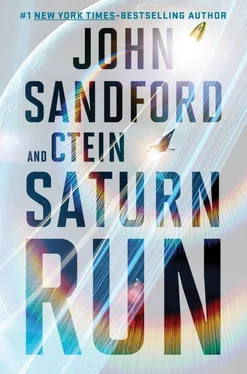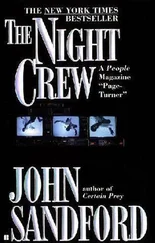The exec said, “Ah, Jesus.”
By the time Peneski spoke with Fang-Castro, the well-lubricated rumor mill was already in overdrive. Not only was the reason for the fight well known, but the details of the Larson orgies were also revealed. Not only revealed, but extensively embroidered upon.
Larson was quoted as having said, “Women are basically recreational areas, with several separate facilities available at any given time.”
The quotation was completely fabricated, but people were entirely unamused. And, of course, then the jokes started, often based on Peneski’s occupation: “Is that a silicon-based life-form in your pocket, or are you just happy to see me?”
“What would you recommend?” Fang-Castro asked Francisco, Crow, and Ang, in the hallway outside the cell where Peneski remained confined.
Crow said, “There was a violent attack. It’s not something you can ignore, even if there’s no danger of another one. There has to be some kind of punishment. Since you’re the captain, you have to decide on what it should be.”
Ang said, “Peneski doesn’t seem irrational—he managed to work himself into a momentary rage, watching them sit at their table, laughing. He says it won’t happen again and I tend to believe him. Whatever the punishment is, I don’t think we should shame him. He’s already shamed enough. And Larson was provoked, beyond question. I’d suggest a monetary fine, a couple of weeks’ pay, for both of them. I would also find out who the other members of the orgy club are, and I would peel the skin off them. It’s not so much the group sex that worries me, it’s the exclusionary attitude—Peneski couldn’t qualify for membership.”
The exec said, “Ah, Jesus.”
Crow: “Ma’am, I would also recommend that you address the situation directly. Call a crew meeting and broadcast it. Be very clear about the limits of what you’ll tolerate.”
“I should say it’s okay to have orgies, but you have to invite everybody? I don’t think so,” Fang-Castro said. “The President would be the teensiest bit annoyed.”
Crow actually smiled at the thought. “That’s not quite what I meant. You outline the damaging effects that this kind of thing has on ship morale, tell them that you won’t put up with it. Tell them to behave like adults on a deadly serious mission, and that while sex is their own affair, morale is your affair. That if they do anything that will impair morale—and indiscreet sexual liaisons might well qualify—you will lock the offenders in the restraint cells with nothing but a TV set and three meals a day, for the duration of the mission. That you will not allow any behavior, even if legal on Earth, that will impair the mission: this ship is not a democracy, and you are the Queen.”
“I can do that,” Fang-Castro said. “I will also make it clear that assaults, for any reason, are not tolerable and no provocation will be considered an acceptable excuse. Don’t look at me like that, Dr. Ang—regardless of the bizarre circumstances, shipboard discipline requires this.”
Ang waved a finger. “If I may make a suggestion? Remind them that shipboard, libido is a privilege. A privilege that can be revoked. I have the necessary drugs. Would you support that?”
Crow interjected, “I can tell you the President would. Hell, she’d likely have them spaced.”
“Which is why she doesn’t get to command a spaceship,” said Fang-Castro. To Ang, she said, “I’ll mention the drugs.”
The exec said, “Ah, Jesus.”
Crow was completely and intensely aware of the crew’s opinion of him—the knot-headed security man, unfriendly, possibly psychopathic, certainly sociopathic, and perhaps even a semi-comic figure, in the Godot sense, unless he happened to be strangling you or pushing you out the air lock. Given the makeup of the rest of the crew, he was considered hardly anyone’s intellectual equal, and was therefore treated with a thinly disguised disdain.
Crow hadn’t graduated first in his class at the Naval Academy because he hadn’t wanted to: something in his makeup insisted that he remain obscure, a man behind a curtain. Adjustments made to his academic record lowered him to the eleventh spot, high enough to be taken seriously, low enough that he wasn’t a threat to anyone.
He’d gone directly from the academy into intelligence work as a Marine Corps officer. Given the nature of intelligence work in the last half of the twenty-first century, he had made himself expert in computer and communications technology, and in statistics. He could speak Mandarin as well as most Western academic China specialists—well enough to understand it and make himself understood—and was fluent in Russian and Portuguese.
His work in the intelligence world gave him a sixth sense about intelligence operations: he was certain the Nixon had been sabotaged. He’d remained publicly ambivalent, even with Fang-Castro, but in his heart, he knew, one hundred percent.
His cabin was heavily shielded. The best electronics security people he’d ever known had come up to the Nixon to make sure of that. After they vouched for its cleanliness, he brought up another group, to check the first. Then he checked it himself. From his cabin, he could talk to his ground support, completely outside normal communications channels.
If the Nixon had been sabotaged, as he believed, there could have been two ways to do that: with a timed action, or with a specific local signal to a prepared bomb of some kind, either virtual or physical, and probably not the latter—though he didn’t entirely discount the possibility.
The timed action would be the most secure way to attack the ship. Once the sabotage was set, it would happen no matter what. There’d be no foul-ups caused by unreliable personnel, no last-minute changes of mind.
The specific local signal would require an agent on board, who could act either by his controller’s demand, or, if he were trusted enough, act of his own volition.
When Reactor 2 went down, it appeared to be a time bomb, set to detonate the Easter egg at a certain point in the trip—after departure but not too far into it, probably triggered by a random, but practically certain, event in the data stream going into the reactor logs.
Crow believed that the Easter egg had probably been created on Earth, and that he could do nothing about it without pushing the ship’s risk profile to an unacceptable level. The fact that there’d been an Easter egg, however, told him something else: that someone—probably China—was willing to take substantial risk to design and carry out sabotage right in the face of extraordinarily heavy security.
That suggested to him that the ship had been the target of a major and extremely intelligent espionage effort, and the effort probably would not have been one-dimensional, entirely dependent on the Easter egg in the software.
A heavy espionage operation would want an ear on the ship, and a way to talk.
A spy.
Crow worked the vid link, though the delay between transmission and reply was beginning to drive him crazy. Phaedra Mellis was on the link this morning, talking in long blocks for the simple efficiency of it:
“Hey, Crow, got an eye-opener for you. We got a call from Will Jackson. They won’t tell us how they got the data, though it has to be human intelligence rather than something they pulled out of the ground. Anyway, the key Celestial Odyssey strategists have been told that Becca Johansson says you might be able to kick up thrust on the remaining engine by no more than three percent and still remain within the 99.5 percent reliability status on the radiators, or, four percent thrust at ninety-seven percent reliability. Those numbers were precise and so was the attribution to Johansson. Jackson ran all the data traffic from you guys through Grendel, and he said that in no case, not even in the encrypted data downloads, were those specific numbers mentioned,” Mellis said.
Читать дальше








